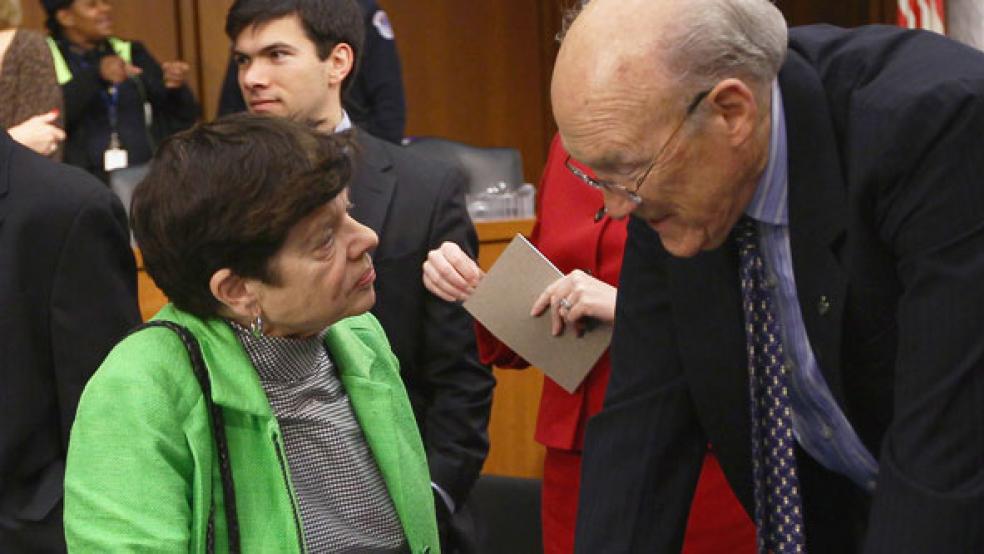Budget experts from both political parties warned at a Business Roundtable forum on Tuesday that the congressional Super Committee preparing for its first meeting later this week needs a long-term vision that goes beyond cutting $1.2 trillion from the federal deficit over the next decade.
“These guys have only a 10-year window. They can get $1.2 trillion fairly easily. But don’t think that’s success,” said Alice Rivlin, founding director of the Congressional Budget Office and a senior fellow at the Brookings Institution. “Success is putting in place longer-term reforms that are going to stabilize the debt… it means a lot more than $1.2 trillion, and it means ultimately what would come out of this would be more like $4 trillion or $5 trillion.”
“If you don’t change the architecture of a broken welfare state, things spring back to life the minute the money shows up,” agreed Douglas Holtz-Eakin, another former CBO director who now heads the American Action Forum, a conservative think tank. “This has to be big enough that everyone’s ox gets gored so the relative scariness is the same for everyone.”
The 12-member bipartisan committee has until Thanksgiving to submit a deficit-reduction proposal to Congress ($1.5 trillion is the goal; $1.2 trillion is the minimum). If the committee reaches a deal, its proposals will be assured an up-or-down vote in the Senate, with no amendments allowed, by December 23. If the committee is unable to agree on a plan, or Congress rejects its proposal, that would trigger $1.2 trillion in automatic, across-the-board spending cuts, split equally between defense and domestic programs.
Social Security, Medicaid, veterans’ benefits, and other “essential” programs would be spared from the mandatory cuts if the committee doesn’t reach an agreement or Congress doesn’t enact their plan. The so-called “sequestration” plan would go into effect in 2013.
The budget experts also warned the proposal needs to establish long-term goals for fiscal policy and pay careful attention to where cuts get made. Rivlin defined success as stabilizing the nation’s debt-to-GDP ratio to ensure that the former is not growing faster than the latter. Fundamental entitlement and tax reform done together are the most obvious ways to accomplish that goal, she said.
Holtz-Eakin expressed concerns that some programs may get cut without careful consideration of the implications. “If they turn this into an exercise of getting to $1.2 trillion, or getting to $1.5 trillion, where all dollar reductions count the same, you will make some terrible policy errors,” he said.
The committee is evenly divided among Democrats and Republicans, with the former intent on safeguarding Medicare and entitlement programs and the latter signed onto anti-tax lobbyist Grover Norquist’s no-new-taxes pledge. Many analysts are skeptical that the two sides can reach a compromise, which would have to include some revenue increases to win over Democrats and some entitlement cuts to win over Republicans.
“Frankly, talking about personalities, if I were going to appoint the 12 people to get a solution, this may not have been the 12 that I would have appointed,” said Dan Crippen, executive director of the National Governors Association and also a former CBO director.
The 12 members include House Ways and Means Committee Chairman Dave Camp, R-Mich.; Energy and Commerce Committee Chairman Fred Upton, R-Mich.; Rep. Jeb Hensarling, R-Tex; Sen. Patty Murray, D-Wash.; Sen. John F. Kerry, D-Mass.; Senate Finance Committee Chairman Max Baucus, D-Mont.; Senate Minority Whip Jon Kyl, R-Ariz.; Sen. Rob Portman, R-Ohio; Sen. Pat Toomey, R-Pa.; Assistant Democratic Leader James Clyburn, D-SC; Democratic Caucus Vice Chair Xavier Becerra, D-CA; and Budget Committee Ranking Member Chris Van Hollen, D-Maryland.
With both camps already gearing up for Election 2012, it seems highly unlikely the committee will develop the far-reaching proposals sought by the budget experts. They’re more likely to come up with “rifle shots that will only get you marginal savings without thinking about how you need to have structural reforms in these programs,” said Nancy Taylor, a former staffer on the Senate Committee on Labor and Human resources. “We need to have a longer-term vision.”





